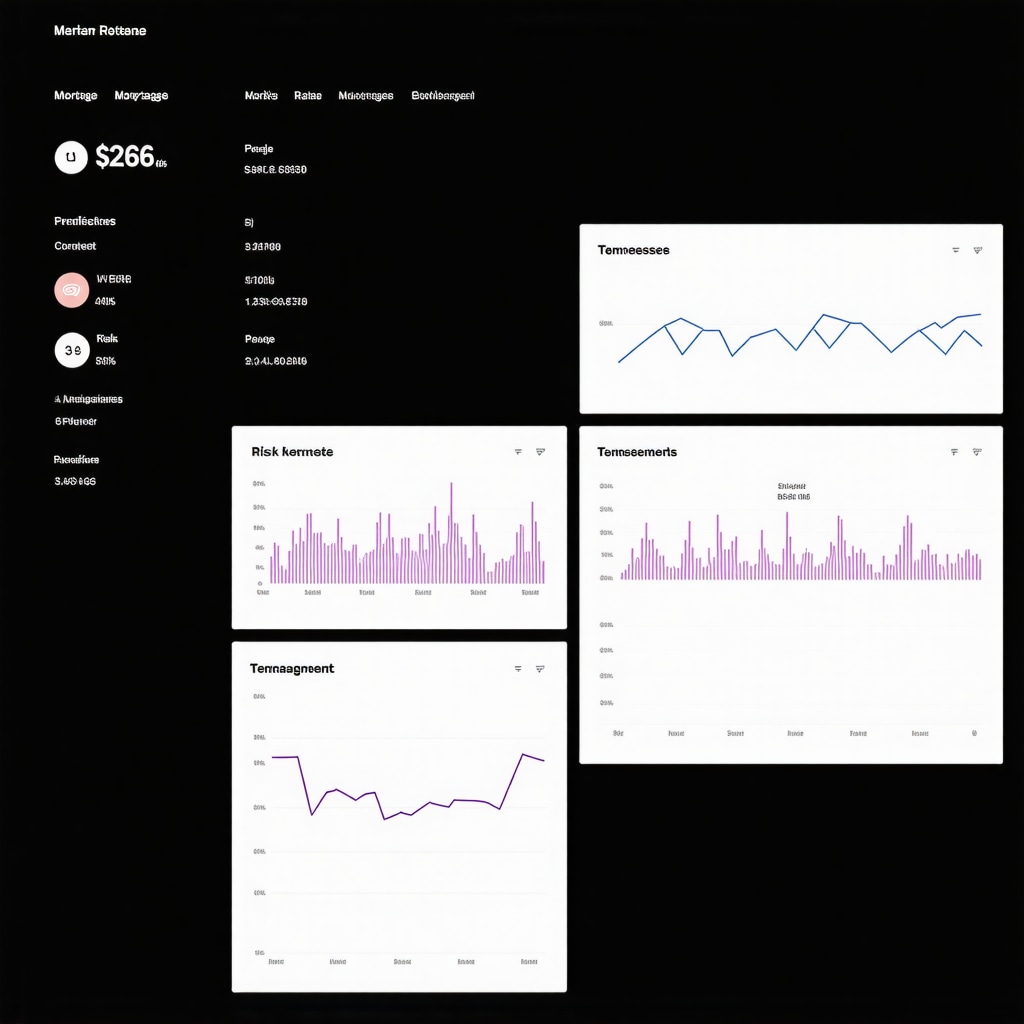Understanding the Current Landscape of Fixed Mortgage Rates in Tennessee
In the dynamic financial environment of 2025, fixed mortgage rates in Tennessee demand a discerning analysis beyond surface-level figures. Fixed rates offer borrowers a predictable payment structure, insulating them from market volatility. However, understanding whether these rates align with an individual’s financial goals requires expertise in mortgage trends, local market variables, and borrower profiles.
Why Tennessee’s Fixed Mortgage Rates Reflect Broader Economic and Regional Nuances
The interplay between national monetary policy and Tennessee’s unique economic factors—such as regional housing supply constraints, employment rates, and local credit score distributions—shapes the fixed mortgage rates offered today. These rates are influenced by the Federal Reserve’s stance, inflation trajectories, and investor demand for mortgage-backed securities, but are also modulated by Tennessee’s credit environment and lender competition.
How Do Fixed Mortgage Rates Compare to Adjustable-Rate Options in Tennessee’s Current Market?
Borrowers often grapple with the decision between fixed and adjustable-rate mortgages. Fixed rates provide stability, which is especially beneficial amid rising interest rates, but typically at a slightly higher initial cost compared to adjustable-rate mortgages (ARMs). For Tennessee buyers anticipating long-term residence, fixed rates can mitigate risk, while ARMs might appeal to those expecting to refinance or move within a few years. This comparative analysis is elaborated in the expert guide on fixed vs adjustable mortgage rates in Tennessee.
Credit Profiles and Their Critical Role in Securing Optimal Fixed Mortgage Rates
Creditworthiness remains a pivotal determinant in the fixed mortgage rate an individual qualifies for. In Tennessee, lenders weigh credit scores, debt-to-income ratios, and payment histories heavily. Borrowers with higher credit scores often unlock significantly lower fixed rates, enhancing affordability over the life of the loan. For strategies on improving your credit score to access better rates, consult how credit scores shape your mortgage interest rates today.
Strategic Timing: When Is the Ideal Moment to Lock in Fixed Mortgage Rates in Tennessee?
The timing of locking a mortgage rate can substantially impact long-term financial outcomes. Given Tennessee’s current market volatility and the Federal Reserve’s cautious signals, prospective borrowers should analyze daily rate fluctuations and forecast trends. Expert advice on locking the best mortgage rates in Tennessee offers nuanced insights into market timing and risk mitigation.
Advanced Considerations: Are Fixed Mortgage Rates the Optimal Choice for Diverse Tennessee Homebuyers?
While fixed rates offer predictability, their suitability varies among Tennessee homebuyers. First-time buyers, retirees, investors, and those with fluctuating incomes must assess their unique circumstances. For example, investment property buyers may prefer different loan structures, as detailed in best mortgage rates for investment properties in Tennessee. Moreover, the nuanced impact of FHA and VA loans on fixed-rate affordability demands specialized scrutiny.
What Are the Hidden Costs and Long-Term Implications of Choosing Fixed Mortgage Rates in Tennessee?
Beyond the nominal interest rate, borrowers must consider closing costs, mortgage insurance premiums, and potential refinancing penalties tied to fixed-rate mortgages. These factors influence the effective cost and flexibility of the loan over time, particularly in a fluctuating market. An expert breakdown of mortgage broker fees and lender comparisons can be found at mortgage broker fees explained for Tennessee buyers.
For further expert analysis and to contribute your insights on Tennessee mortgage strategies, visit our contact page to engage with industry professionals.
According to a recent Federal Reserve Monetary Policy Report (April 2025), fixed mortgage rates are expected to maintain moderate volatility influenced by inflation trends and economic growth metrics, underscoring the importance of informed decision-making for Tennessee borrowers.
Unpacking the Role of Local Economic Indicators in Tennessee Fixed Mortgage Rates
While national economic trends significantly influence mortgage rates, localized factors in Tennessee often create divergence from national averages. For instance, Tennessee’s diversified economy, which includes sectors like manufacturing, healthcare, and tourism, contributes to regional employment stability. This stability can reduce lender risk perception, thereby potentially resulting in more competitive fixed mortgage rates for borrowers within certain counties. Conversely, areas facing job market uncertainty may experience slightly elevated rates as lenders price in risk.
Moreover, housing supply shortages in metropolitan areas like Nashville and Memphis exert upward pressure on property values, indirectly affecting mortgage lending criteria and rates. Understanding these microeconomic dynamics can empower Tennessee borrowers to better negotiate fixed-rate mortgage terms tailored to their specific local market conditions.
Innovative Financing Tools Complementing Fixed Mortgage Solutions in Tennessee
Beyond traditional fixed-rate mortgages, Tennessee homebuyers can leverage emerging financing tools designed to enhance affordability and flexibility. For example, lender credits or rate buydowns allow borrowers to reduce their fixed mortgage interest rates upfront by paying additional fees at closing. This strategy can be particularly advantageous in a rising rate environment, offering long-term savings without sacrificing rate stability.
Additionally, combining fixed-rate mortgages with state-specific assistance programs or grants can lower initial costs, making homeownership more accessible for first-time buyers or those with moderate incomes. Tennessee-specific initiatives often provide down payment assistance or closing cost grants, which, when paired with a fixed-rate loan, create a more manageable financial pathway.
How Can Tennessee Homebuyers Strategically Balance Fixed Rate Stability with Market Flexibility?
Expert mortgage advisors frequently debate the optimal balance between the predictability of fixed rates and the potential cost savings of adjustable-rate options. For Tennessee borrowers planning to hold properties long-term, fixed rates reduce uncertainty and simplify budgeting, especially in volatile markets. However, those anticipating relocation or refinancing within 5-7 years might benefit from a hybrid approach, such as a fixed-rate period followed by adjustable terms.
Crucially, borrowers should assess their financial resilience, anticipated market shifts, and personal timelines before committing. Utilizing tools like mortgage rate trackers and consulting with local mortgage brokers can aid in crafting a balanced mortgage strategy responsive to both current conditions and future expectations. For an in-depth comparison, see our comparing fixed vs adjustable mortgage rates in Tennessee guide.
Understanding the Impact of Regulatory Changes on Tennessee’s Fixed Mortgage Rates
Recent federal and state regulatory updates have subtly shifted the mortgage landscape in Tennessee, affecting fixed-rate offerings. Changes in appraisal standards, disclosure requirements, and lending thresholds influence lender underwriting processes and risk assessments. These adjustments can lead to more stringent qualification criteria but also promote consumer protection and market stability.
For Tennessee borrowers, staying informed about evolving regulations is essential to anticipate changes in available fixed-rate products and associated costs. Engaging with mortgage professionals who monitor these regulatory trends ensures borrowers receive accurate advice tailored to the latest compliance environment.
What Are the Long-Term Financial Implications of Locking Fixed Mortgage Rates Amidst Regulatory Shifts?
Locking a fixed mortgage rate in a regulatory environment characterized by change demands a strategic approach. Borrowers must weigh the benefits of current rate security against the possibility of future market adjustments driven by new legislation or policy shifts. While locking rates can shield against immediate interest rate hikes, unexpected regulatory changes might affect loan terms or refinancing opportunities.
Consulting authoritative sources like the Consumer Financial Protection Bureau provides updated guidelines and consumer advisories relevant to rate locking decisions. Additionally, partnering with experienced Tennessee mortgage brokers can offer personalized risk assessments and contingency planning.
If you found these insights valuable, consider sharing this article with fellow Tennessee homebuyers or leaving a comment below to discuss your fixed rate experiences. For continuous updates on mortgage strategies, explore our step-by-step mortgage application process in Tennessee guide.
Leveraging Predictive Analytics to Forecast Tennessee Fixed Mortgage Rate Trends
In 2025, the integration of predictive analytics into mortgage rate forecasting has transformed how Tennessee homebuyers strategize their financing. By harnessing large datasets—including historical rate fluctuations, macroeconomic indicators, and localized housing market signals—advanced models can anticipate rate movements with increasing precision. These tools enable borrowers to time their fixed rate locks more effectively, reducing exposure to adverse market shifts.
For example, machine learning algorithms analyze Tennessee-specific variables such as regional employment indices, inflation expectations, and mortgage-backed security yields to project rate directionality. This empowers borrowers and lenders alike to adapt dynamically, optimizing loan structures and mitigating risks associated with unforeseen economic shocks.
How Do Predictive Models Incorporate Tennessee’s Unique Economic Variables to Enhance Mortgage Rate Decisions?
Unlike generic national models, Tennessee-focused predictive frameworks integrate granular data such as county-level unemployment rates, credit score distributions, and local housing inventory metrics. By weighting these factors, models generate tailored forecasts that reflect the state’s heterogeneous economic landscape. This specificity is crucial given Tennessee’s varied metropolitan and rural markets, each exhibiting distinct borrower risk profiles and lender competition levels.
Borrowers leveraging these insights can negotiate fixed mortgage rates that better align with their long-term financial plans, especially in markets like Nashville and Chattanooga where economic growth and housing demand diverge significantly. Detailed discussions on these methodologies can be found in the JPMorgan Chase research on predictive analytics in mortgage lending.

Integrating Risk Management Strategies with Fixed Rate Mortgages in Tennessee’s Volatile Market
Fixed mortgage rates provide stability, but sophisticated Tennessee borrowers increasingly pair them with risk management tactics to optimize overall financial resilience. Techniques such as rate buydowns, interest rate caps, and secondary financing instruments allow borrowers to customize risk exposure while maintaining predictable payments.
Moreover, refinancing strategies are being recalibrated in light of early repayment penalties and changing regulatory frameworks. For investors or homeowners anticipating income variability, layered financing solutions—combining fixed rates with contingency reserves or adjustable components—offer both security and adaptability.
What Risk Mitigation Approaches Are Best Suited for Tennessee Borrowers Opting for Fixed-Rate Mortgages?
Effective risk mitigation depends on a borrower’s time horizon, credit profile, and market expectations. In Tennessee’s current context, strategies like securing a fixed rate with a buydown during periods of high rates can reduce initial monthly obligations, providing breathing room during economic adjustments. Alternatively, pairing fixed-rate loans with financial instruments like interest rate swaps or options can hedge against future rate increases.
Partnering with mortgage advisors versed in Tennessee’s regulatory landscape is essential to navigate these complexities. For exhaustive guidance, explore resources from the Mortgage Bankers Association on advanced mortgage risk management.
Deciphering the Impact of Macroeconomic Inflation Expectations on Tennessee Fixed Mortgage Rates
Inflation expectations remain a dominant force shaping fixed mortgage rates nationwide, and Tennessee is no exception. Lenders price these expectations into rates to safeguard returns against eroding purchasing power. Consequently, understanding inflation trajectories—driven by factors such as energy prices, wage growth, and fiscal policies—is critical for Tennessee borrowers locking fixed rates.
In 2025, the Federal Reserve’s nuanced approach to inflation targeting, coupled with Tennessee’s localized economic performance, creates a complex backdrop for mortgage rate setting. Borrowers who anticipate accelerating inflation may prefer to secure fixed rates promptly to avoid costlier borrowing later. Conversely, in a disinflationary scenario, delaying rate locks could be advantageous.
How Should Tennessee Homebuyers Adjust Fixed Mortgage Rate Strategies Amid Shifting Inflation Expectations?
Borrowers must monitor both national inflation data and Tennessee-specific cost-of-living indices to inform timing decisions. Tools like the Consumer Price Index (CPI) and Producer Price Index (PPI), combined with regional economic reports, provide a layered understanding of inflation pressures. Engaging with financial experts who interpret these indicators in the mortgage context can significantly enhance decision-making.
For authoritative inflation data and forecasts, consult the U.S. Bureau of Labor Statistics Consumer Price Index. Additionally, Tennessee’s Department of Economic and Community Development provides localized economic analysis pertinent to housing finance.
Interested in refining your mortgage strategy with expert insights tailored to Tennessee’s evolving market? Connect with our mortgage professionals for personalized consultations and stay ahead of rate trends.
Elevating Fixed Mortgage Strategies with Derivatives and Hedging Mechanisms in Tennessee
In the evolving mortgage landscape of Tennessee, sophisticated borrowers and institutional investors increasingly incorporate derivatives such as interest rate swaps and caps to hedge against unforeseen rate shifts. These instruments, traditionally reserved for corporate finance, are becoming accessible through specialized mortgage products, allowing Tennessee homebuyers to lock fixed rates while mitigating exposure to market volatility.
Such hedging mechanisms can be tailored to individual risk appetites, offering layered protection beyond conventional fixed-rate structures. For instance, an interest rate cap embedded within a fixed mortgage can limit upward payment adjustments in adjustable phases or during refinancing, effectively blending stability with flexibility.
Leveraging Machine Learning for Hyperlocal Mortgage Rate Personalization
Beyond generalized predictive analytics, Tennessee lenders are deploying machine learning models that integrate borrower-specific data, including credit utilization patterns, income stability metrics, and even behavioral analytics derived from transaction histories. This hyperlocal personalization enables finely tuned fixed mortgage rate offerings that reflect nuanced risk assessments, potentially lowering rates for qualified borrowers in competitive submarkets such as Franklin and Knoxville.
Machine learning algorithms continuously recalibrate risk profiles as new data streams emerge, ensuring rate quotes remain responsive to evolving borrower circumstances and economic conditions. This dynamic pricing paradigm represents a paradigm shift from static rate sheets to intelligent, adaptive mortgage pricing.
How Can Tennessee Borrowers Utilize Advanced Financial Models to Optimize Fixed Mortgage Rate Timing and Terms?
Borrowers aiming to capitalize on cutting-edge financial modeling should actively engage with lenders employing these technologies. By providing comprehensive financial data and articulating long-term ownership plans, Tennessee homebuyers can benefit from bespoke rate offers informed by both macroeconomic trends and microeconomic borrower profiles.
Moreover, integrating scenario analysis tools that simulate rate trajectories under varying economic conditions can aid in selecting fixed mortgage terms that balance cost efficiency with risk tolerance. This approach requires collaboration with mortgage advisors versed in quantitative finance and local market dynamics.
For further authoritative insights into integrating advanced analytics within mortgage lending, the JPMorgan Chase research on predictive analytics in mortgage lending offers a comprehensive overview.
Unlock the full potential of your Tennessee fixed mortgage by consulting with specialized financial advisors who can tailor strategies using these advanced tools. Contact our expert team today to elevate your mortgage planning with data-driven precision.

Exploring the Intersection of Behavioral Economics and Fixed Mortgage Decision-Making in Tennessee
Recent research in behavioral economics reveals that cognitive biases and heuristics significantly influence Tennessee borrowers’ fixed mortgage choices, often leading to suboptimal financial outcomes. Anchoring on initial rate quotes, overestimating future rate increases, or underappreciating refinancing costs can skew decision-making processes.
Mortgage advisors employing behavioral insights guide borrowers through structured decision frameworks, mitigating emotional biases and enhancing long-term financial resilience. Techniques like scenario visualization and probabilistic outcome modeling empower Tennessee homebuyers to make more rational, informed fixed-rate commitments.
Expert Insights & Advanced Considerations
Dynamic Credit Profiles Remain the Keystone of Optimal Fixed Rates
In Tennessee’s evolving mortgage market, lenders increasingly utilize granular credit analytics beyond traditional scores. Borrowers who proactively manage credit utilization, timely payments, and debt-to-income ratios position themselves to secure more competitive fixed mortgage rates. For actionable strategies, reviewing how credit scores shape your mortgage interest rates today offers indispensable guidance.
Local Market Nuances Demand Hyperlocal Rate Analysis
Tennessee’s metropolitan hubs like Nashville, Memphis, and Knoxville exhibit distinct economic indicators that affect fixed mortgage pricing. Advanced predictive analytics models now incorporate county-level employment data and housing inventory to tailor rate offers. Borrowers attuned to these microeconomic factors can negotiate better terms by aligning their applications with localized market conditions.
Strategic Timing and Risk Management Are Non-Negotiable in 2025
Locking in fixed mortgage rates at the optimal moment requires balancing Federal Reserve signals with inflation forecasts and Tennessee-specific economic trends. Incorporating risk mitigation, such as rate buydowns or embedded interest rate caps, can protect borrowers from volatility while preserving payment stability. Expert consultation is crucial for navigating these nuanced decisions effectively.
Innovative Financing and Regulatory Awareness Enhance Borrower Outcomes
Emerging financing tools, including lender credits and state assistance programs, combined with a keen understanding of recent regulatory changes, empower Tennessee homebuyers to maximize affordability. Staying informed about appraisal standards, disclosure requirements, and underwriting thresholds ensures borrowers capitalize on the best fixed-rate products tailored to their profiles.
Curated Expert Resources
Federal Reserve Monetary Policy Report (April 2025): Offers authoritative insights into macroeconomic factors shaping mortgage rate trends nationwide and regionally.
JPMorgan Chase Research on Predictive Analytics in Mortgage Lending: Delivers a comprehensive overview of how advanced data-driven models refine mortgage rate forecasting and personalization.
Mortgage Bankers Association – Advanced Risk Management: Provides detailed guidance on integrating sophisticated risk mitigation strategies into fixed mortgage planning.
Consumer Financial Protection Bureau (CFPB): Essential for staying updated on regulatory changes affecting mortgage underwriting and disclosures.
Tennessee Department of Economic and Community Development: Offers localized economic data crucial for understanding market-specific mortgage rate dynamics.
Final Expert Perspective
Mastering fixed mortgage rates in Tennessee in 2025 demands a multidimensional approach that integrates credit management, local market intelligence, timing precision, and regulatory vigilance. Borrowers who leverage advanced analytics and risk management tools position themselves to secure financially sound, stable mortgage terms amidst market volatility. As you refine your mortgage strategy, consider engaging with specialized Tennessee mortgage professionals who can tailor solutions aligned with your unique circumstances. For an in-depth comparative analysis, explore our expert guide on fixed vs adjustable mortgage rates in Tennessee and connect via our contact page to discuss personalized strategies that empower your home financing journey.

